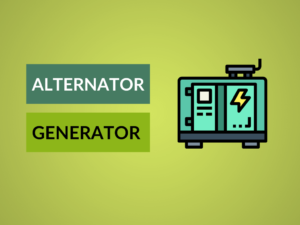Alternator vs. Generator: Understanding the Differences
What is an Alternator?
An alternator is a device that converts mechanical energy into electrical energy. It uses the principle of electromagnetic induction to produce an alternating current (AC). Alternators are commonly used in modern vehicles to charge the battery and power the electrical system.
Examples of Alternators:
– Car alternators
– Wind turbine alternators
– Diesel generator alternators
Uses of Alternators:
– Automotive charging systems
– Power generation in renewable energy systems
– Backup power supply in emergencies
What is a Generator?
A generator, also known as a dynamo or an electric generator, is a device that converts mechanical energy into electrical energy through electromagnetic induction. It produces direct current (DC) or alternating current (AC) depending on the design and construction of the generator.
Examples of Generators:
– Portable gasoline generators
– Standby home generators
– Industrial power generators
Uses of Generators:
– Providing electricity in remote locations
– Emergency power backup for homes or businesses
– Powering construction sites and outdoor events
Differences between Alternators and Generators:
| Difference Area | Alternator | Generator |
|---|---|---|
| Current Type | Produces alternating current (AC) | Produces direct current (DC) or alternating current (AC) |
| Design Principle | Based on electromagnetic induction | Based on electromagnetic induction or static magnetic field |
| Power Generation | Capable of stable power output | Capable of fluctuating power output |
| Efficiency | Higher efficiency | Lower efficiency |
| Operating Speed | Operates at higher speeds (typically over 1,000 RPM) | Operates at lower speeds (around 3600 RPM for standard generators) |
| Size and Weight | Generally smaller and lighter | Often larger and heavier due to additional components |
| Cost | Usually more expensive | Generally less expensive |
| Voltage Regulation | Produces stable voltage output | Requires additional voltage regulation equipment for stable output |
| Application | Commonly used in vehicles and modern power systems | Widely used in various power generation scenarios |
| Complexity | Less complex in terms of wiring and control systems | Often more complex due to additional components and control systems |
Conclusion:
In summary, alternators and generators both convert mechanical energy into electrical energy, but they operate on different principles and have distinct characteristics. Alternators primarily produce alternating current (AC) and are commonly used in automotive and power generation applications. On the other hand, generators can produce either direct current (DC) or alternating current (AC) and are versatile in various power generation scenarios.
People Also Ask:
1. What is the main difference between an alternator and a generator?
The main difference lies in the type of current produced. Alternators generate alternating current (AC), while generators can generate either direct current (DC) or alternating current (AC).
2. Are alternators and generators interchangeable?
While they share similarities, they are not interchangeable due to differences in design, voltage regulation, and power output stability.
3. Which is more efficient, an alternator or a generator?
Alternators are generally more efficient than generators due to their higher power output stability and improved voltage regulation.
4. Can alternators and generators be used for the same applications?
Alternators are commonly used in automotive applications and modern power systems, while generators are widely used for power generation in various scenarios, including backup power supply for homes and businesses.
5. Do alternators and generators require maintenance?
Both alternators and generators require regular maintenance, such as cleaning, lubrication, and periodic inspections, to ensure optimal performance and longevity.


